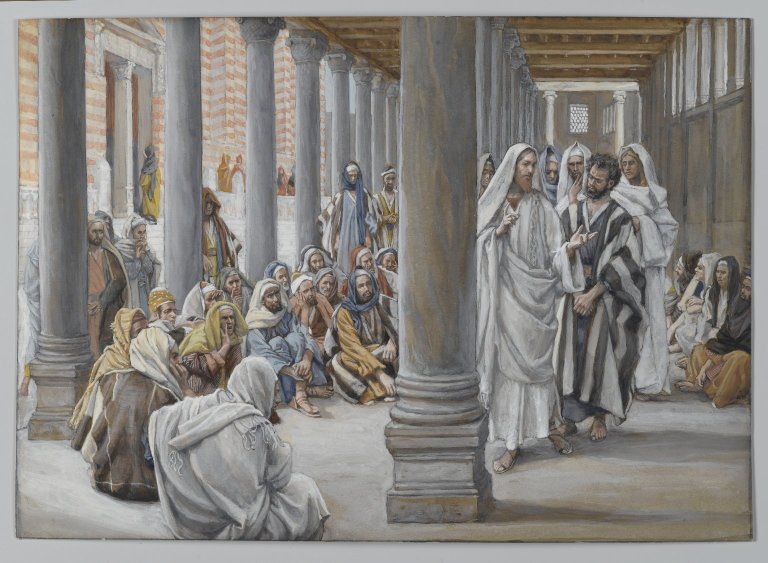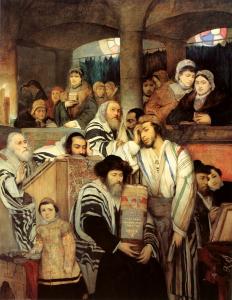(Lectionary for April 15, 2018)
 Whenever I enter the world of the New Testament, my Hebrew Bible antennae begin to quiver, and I look with the greatest care at the ways in which the characters of the tales think about and use the material I love from the earlier testament. Acts 3 sets my radar buzzing, and not in a good way. That infamous sermon that Peter gives in Acts 2, wherein he excoriates his Jewish listeners for their murder of Jesus, thereby slaying their own Messiah, remains for me one of the darkest moments in Christian history. Ironically, that sermon is celebrated with loud music and splashes of red colors in our churches on the day of Pentecost, the supposed birthday of the church. Yet, who can miss the overt and monstrous anti-Judaism the sermon enshrines and the seeds of anti-Semitism that resulted? Fortunately, later in Acts we will read of the struggle of the early church to include all those who are receptors of the work of the Holy Spirit, even those not following kosher food laws or who are uncircumcised, but surely including both groups, which holds out hope that Christianity is not necessarily tainted forever with bigotry against Judaism. Still, in chapter 3, the pain is still there, and the Jews are once again excoriated by the apostle Peter.
Whenever I enter the world of the New Testament, my Hebrew Bible antennae begin to quiver, and I look with the greatest care at the ways in which the characters of the tales think about and use the material I love from the earlier testament. Acts 3 sets my radar buzzing, and not in a good way. That infamous sermon that Peter gives in Acts 2, wherein he excoriates his Jewish listeners for their murder of Jesus, thereby slaying their own Messiah, remains for me one of the darkest moments in Christian history. Ironically, that sermon is celebrated with loud music and splashes of red colors in our churches on the day of Pentecost, the supposed birthday of the church. Yet, who can miss the overt and monstrous anti-Judaism the sermon enshrines and the seeds of anti-Semitism that resulted? Fortunately, later in Acts we will read of the struggle of the early church to include all those who are receptors of the work of the Holy Spirit, even those not following kosher food laws or who are uncircumcised, but surely including both groups, which holds out hope that Christianity is not necessarily tainted forever with bigotry against Judaism. Still, in chapter 3, the pain is still there, and the Jews are once again excoriated by the apostle Peter.
At the beginning of chapter 3, Peter and John are “going up to the temple at the hour of prayer” (Acts 3:1). They encounter a man lame from birth who each day is carried to the “Beautiful Gate” where he can beg for alms. There is much scholarly discussion of just where this particular gate may be in the vast complex of the Herodian temple, but wherever it may have been, the man can expect to be well served by persons going to and fro into and out of the temple itself. Peter famously looked at the man “with intent,” and announces to him that though he has no silver or gold to offer, he can in the name of Jesus cure him. And so he does. Whereupon the formerly lame man leaps and dances his way into the temple, causing amazement and surprise among the worshippers.
Peter then moves from the Beautiful Gate to Solomon’s Portico, a presumably columned and covered place somewhere on the complex outside the temple. We cannot know the exact location of these spots since the Herodian temple was completely destroyed by Titus in 70 CE, not long after it was finally completed. All that remains are a few of the huge stones that served as foundation for the giant platform that supported the complex of buildings that included the temple itself. Peter, standing under the portico, again attacks the Jewish worshippers who are astounded at the cured man. “Why do you stare at us,” he mocks, as if he and John had some sort of magic powers to effect cures? No, it was the power of the God of Abraham, Isaac, and Jacob who has done this wonder. Well and good. Peter accepts no special gift, but gives God the credit. Would that he had stopped there.
“That God has glorified his servant (some manuscripts read “child”) Jesus, whom you handed over and rejected in the presence of Pilate, although he had decided to release him” (Acts 3:13). Peter calls attention to each of the gospel’s concern to exonerate the Romans of the murder of Jesus and accuse the Jews of the deed. Matthew goes so far as to have the Jews in the courtyard scream for Jesus’ crucifixion, saying, “Let his blood be on our heads and on our children,” one of the most terrible lines of Scripture, if not the single most terrible. It is of course wonderfully politic for Luke to play down Roman guilt and build up Jewish responsibility for the death of Jesus. After all, it is still a very Roman world, while the Jews have little real power. Blaming the weakest culprit is ever a good course, and announcing the relative innocence of the powerful group never hurts.
But Peter is hardly through with his diatribe. “You rejected the Holy and Righteous One and asked to have a murderer given to you, while you killed the author of life, whom God raised from the dead. To this we are witnesses” (Acts 3:14-15). Not merely witnesses to the resurrection, note, but witnesses to the Jewish perfidy that murdered their own Messiah, and rescued, in deepest irony, a man called “son of the father” (Barrabas).
Then Peter softens a bit as he says, “And now, friends, I know that you acted in ignorance (cue Jesus from the cross), as did also your leaders. In this way God fulfilled what God had foretold through all of the prophets, that God’s Messiah would suffer” (Acts 3:17-18). Peter engages here in a bit of preacherly hyperbole, claiming that “all of the prophets” spoke of this. They clearly did not, but the Christian reading of Isaiah 52- 53 is certainly in the background. By quoting all the Hebrew prophets, and by referring to the God of Abraham, Isaac, and Jacob, Peter proclaims to his Jewish listeners that they are indeed guilty of the death of the very Messiah that God had sent to them specifically, the very one that God had promised throughout their own scriptures. What else can he then demand but, “Repent, and turn to God so that your sins may be wiped away,” most especially the sin of Messiah murder.
The end of the sermon does not soften the charge in the least. Quoting now Deuteronomy’s claim that “YHWH God will raise up for you from your own people a prophet like me” (Moses), and that “you must listen to whatever he tells you. And it will be that everyone who does not listen to that prophet will be utterly rooted out of the people” (Acts 3:22-23). Jesus was and is that prophet, and you are the heirs of the God who promised Abraham that through him and his descendants all the families of the earth will be blessed. So God raised up this servant, and sent him to you Jews first to bless you and to turn you from your wicked ways. But obviously it did not work, because you rejected God’s gift and killed the one God sent. What else can those Jews think but that Peter hates them and God hates them, too?
This is appalling stuff, and its echoes reverberate still in the sanctuaries of Christians and behind the barbed wire of concentration camps in Poland and Germany, from Dachau to Buchenwald to Auschwitz. Please do not imagine that scriptural words are not powerful, because they surely are. Just as many Bible readers still impugn the very lives of our LGBTQ colleagues by gross readings of a handful of biblical texts, so year after year we allow these egregious anti-Jewish texts a prominent place in our hymns, liturgies, and sermons. I urge you preachers to take this text and unpack its negative connotations for Jews in the presence of your congregations. Surely at last we can stop these dangerous and finally unchristian assaults on our Jewish neighbors once and for all.
(Images from Wikimedia Commons)











